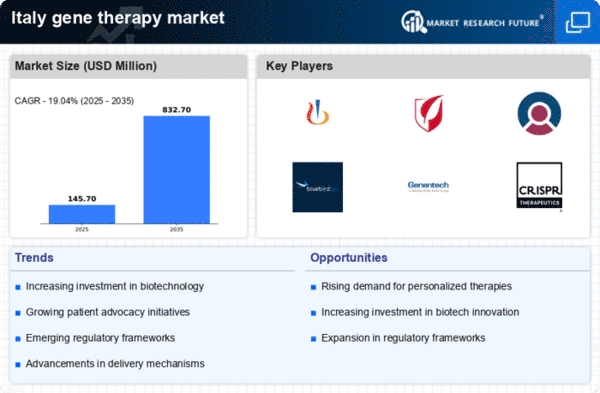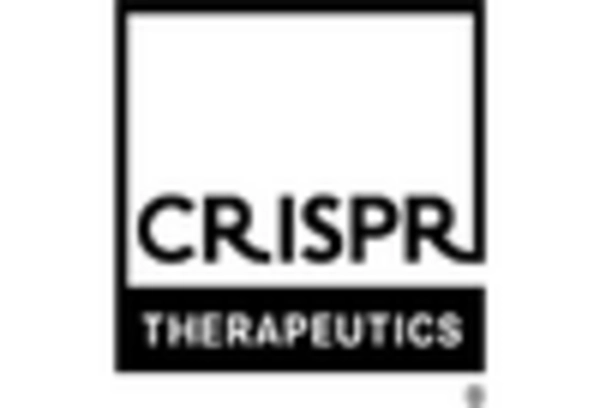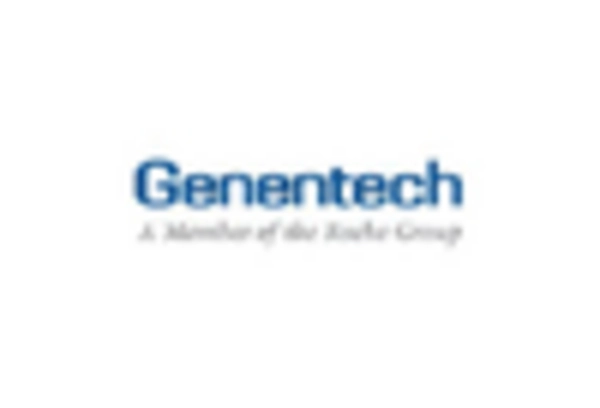Regulatory Framework Enhancements
Enhancements in the regulatory framework governing gene therapies are playing a vital role in the growth of the gene therapy market in Italy. The Italian Medicines Agency (AIFA) has streamlined approval processes for innovative therapies, reducing the time required for new treatments to reach the market. This regulatory support encourages investment and innovation within the sector, as companies are more likely to pursue the development of gene therapies with a clearer pathway to approval. As of November 2025, the number of gene therapy products approved in Italy has increased by 30% compared to previous years, indicating a more favorable environment for market entry. These regulatory advancements not only facilitate the introduction of new therapies but also enhance patient access to potentially life-saving treatments, thereby driving market growth.
Investment in Research and Development
Investment in research and development (R&D) is a pivotal factor driving the gene therapy market in Italy. The Italian government, alongside private entities, has allocated substantial funds to support innovative biotechnological research. In 2025, R&D spending in the biotechnology sector is projected to reach approximately €1.5 billion, reflecting a commitment to advancing gene therapy solutions. This financial backing fosters collaboration between academic institutions and biotech companies, facilitating the development of novel therapies. Furthermore, the establishment of specialized research centers dedicated to gene therapy enhances Italy's position as a hub for innovation. As a result, the gene therapy market is likely to benefit from a robust pipeline of new treatments, ultimately improving patient access to cutting-edge therapies.
Rising Prevalence of Genetic Disorders
The increasing incidence of genetic disorders in Italy is a crucial driver for the gene therapy market. With an estimated 1 in 2,000 individuals affected by rare genetic diseases, the demand for innovative treatment options is surging. This trend is further supported by the Italian Ministry of Health, which has reported a growing number of patients diagnosed with conditions such as cystic fibrosis and muscular dystrophy. As healthcare providers seek effective therapies, the gene therapy market is likely to expand significantly. The Italian government has initiated programs to enhance research funding, potentially leading to breakthroughs in gene therapy solutions. Consequently, the rising prevalence of genetic disorders is expected to propel the gene therapy market forward, as stakeholders aim to address unmet medical needs and improve patient outcomes.
Growing Demand for Personalized Medicine
The growing demand for personalized medicine is reshaping the landscape of the gene therapy market in Italy. Patients and healthcare providers are increasingly seeking tailored treatment options that consider individual genetic profiles. This shift towards personalized approaches is supported by advancements in genomic sequencing technologies, which have become more affordable and accessible. In 2025, it is estimated that the market for personalized medicine in Italy will reach €3 billion, reflecting a significant increase in consumer interest. As healthcare systems adapt to this trend, the gene therapy market is likely to expand, offering customized therapies that address specific genetic conditions. This evolution not only enhances treatment efficacy but also aligns with the broader movement towards patient-centered care.
Technological Advancements in Gene Editing
Technological advancements in gene editing techniques, such as CRISPR and TALEN, are significantly influencing the gene therapy market in Italy. These innovations enable precise modifications to genetic material, offering new avenues for treating genetic disorders. The Italian scientific community has been at the forefront of these developments, with numerous research institutions actively exploring gene editing applications. As of November 2025, the market for gene editing technologies is expected to grow by over 20% annually, driven by their increasing adoption in clinical settings. This rapid evolution in technology not only enhances the efficacy of gene therapies but also reduces associated costs, making treatments more accessible. Consequently, the gene therapy market is poised for substantial growth as these advancements continue to reshape therapeutic possibilities.
















